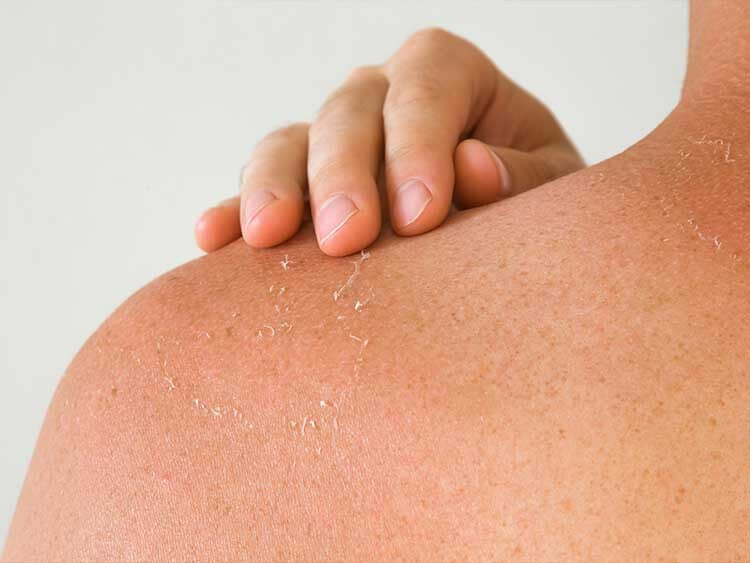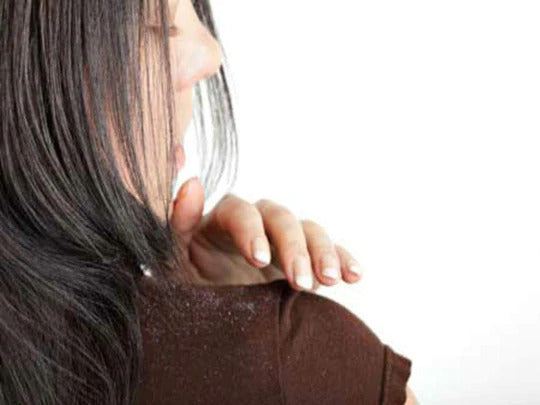Scalp acne is a common condition that can be uncomfortable and embarrassing. It is a form of acne that appears on the scalp and can range from mild to severe. Finding the right treatments and managing current outbreaks of scalp acne is possible with the right knowledge of its causes. The overall health of the scalp can be improved, and discomfort and embarrassment can be avoided by being aware of the causes of scalp acne and taking action to manage and prevent outbreaks.
Identifying the Causes of Scalp Acne
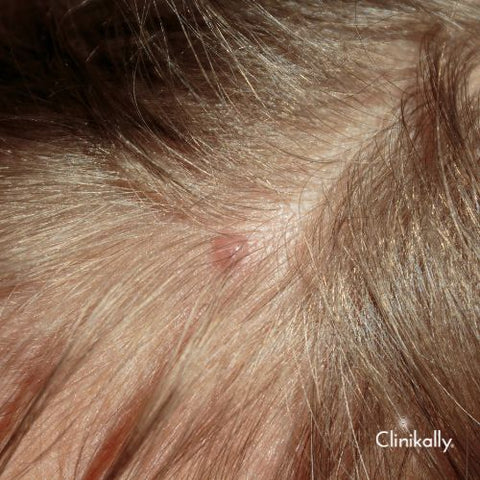
Scalp hair follicles clogged with dead skin cells, oil, and other impurities cause scalp folliculitis, also known as scalp acne, which is a common skin condition. This can result in the formation of pimples, blackheads, and whiteheads. Some of the most common causes of scalp acne are as follows:
-
Excessive oil production: Sebum, or the natural oil produced by the scalp, keeps the skin and hair moisturized. However, excessive oil production can cause scalp acne to appear. A poor diet, genetics, or hormonal imbalances may be to blame for this.
-
Dead skin cells: If they build up on the scalp, dead skin cells can clog hair follicles and cause acne.
-
Bacteria and fungi: These microorganisms can also play a role in the emergence of scalp acne. Lack of proper scalp hygiene can allow bacteria and fungus to flourish, resulting in inflammation and acne.
-
Hair product irritability: A few hair products have the potential to aggravate the scalp and lead to acne. These products may contain harsh chemicals like silicones and sulfates that can irritate the scalp and strip it of its natural oils.
-
Friction and pressure: On the scalp, friction and pressure can also result in acne. This can happen if you brush or comb your hair a lot, wear tight hats or headbands, or both.
-
Stress: Stress may also be a factor in the occurrence of scalp acne. Stress can lead to hormonal imbalances, which can increase oil production and inflammation on the scalp.
Hormonal Imbalances and Scalp Breakouts
Hormonal imbalances can play a role in the development of scalp breakouts. The production of sebum, the oil the scalp produces to maintain the moisture of the hair and skin, is controlled by hormones. When hormones are out of balance, sebum production increases, clogging hair follicles and contributing to scalp breakouts. The following are some typical hormonal imbalances that can cause scalp breakouts:
-
Puberty: Hormone production, including androgen production, increases during puberty. Sebum production can be influenced by androgens, which can result in breakouts on the scalp.
-
Menstrual cycle: Hormonal changes that occur during the menstrual cycle may also be a factor in scalp eruptions. During the menstrual cycle, particularly during ovulation and menstruation, many women develop breakouts.
-
Pregnancy: Hormonal alterations throughout pregnancy may also be a factor in scalp eruptions. During pregnancy, particularly in the first trimester, some women develop acne or scalp breakouts.
-
Menopause: Hormonal changes associated with menopause may also be a factor in scalp eruptions. It's possible that as estrogen levels fall, testosterone levels rise, which can increase sebum production and cause acne.
-
Polycystic ovary syndrome (PCOS): PCOS is a hormonal disorder that can result in an androgen imbalance. This can result in an increase in sebum production as well as acne on the scalp and other parts of the body.
The Role of Hair Products and Styling Tools
Hair products and styling tools can contribute to scalp breakouts. Ingredients found in shampoos, conditioners, and styling products have the potential to irritate the scalp, clog hair follicles, and cause acne. Furthermore, styling tools such as flat irons and curling irons can cause friction and heat damage to the scalp, increasing the risk of breakouts. The following are some typical ways that hair styling products and tools can cause scalp breakouts:
-
Ingredients: Silicones, sulfates, and fragrances are frequently found in shampoos, conditioners, and styling products for hair, which can irritate the scalp and clog hair follicles. These substances may cause acne breakouts on the scalp by accumulating bacteria and dead skin cells.
-
Overuse: Excessive use of hair products can also cause breakouts on the scalp. A residue on the scalp caused by using too much product or not thoroughly rinsing hair can clog hair follicles and worsen acne.
-
Styling instruments: Styling instruments like curling irons and flat irons can generate heat and friction that harm the scalp and raise the possibility of breakouts. Using these tools too often
Poor Scalp Hygiene and Bacterial Overgrowth
Poor scalp hygiene can result in bacterial overgrowth, which can contribute to scalp breakouts. Many different types of bacteria live on the scalp, some of which are beneficial and aid in the maintenance of a healthy scalp microbiome. When the scalp is not properly cleaned, however, harmful bacteria can grow and multiply, resulting in inflammation and acne. Following are some typical ways that bad scalp hygiene can fuel bacterial overgrowth and breakouts on the scalp:
-
Unregular washing: A buildup of oil, dirt, and dead skin cells on the scalp from infrequent washing can serve as a breeding ground for dangerous bacteria.
-
Overwashing: This practice can also encourage bacterial growth. The scalp's natural oils can be removed by excessive washing, which can cause dryness and irritation and foster the growth of dangerous bacteria.
-
Ineffective washing methods: Ineffective washing methods can also encourage the growth of bacteria. When washing, it's crucial to massage the scalp thoroughly to get rid of any oil and dirt buildup.
-
Sharing personal items: Sharing accessories like hats, combs, and brushes can also encourage the growth of bacteria. These items make it simple for bacteria to spread from one person to another, which can result in acne outbreaks.
Effective Remedies for Treating Scalp Acne
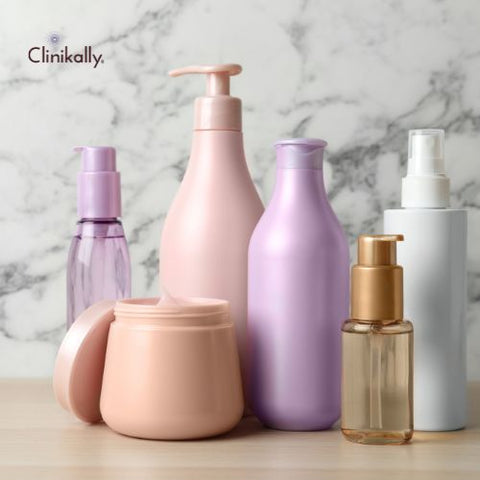
Depending on how severe the condition is, there are a number of effective treatments for scalp acne. Here are a few possibilities:
-
Shampoos containing salicylic acid, and benzoyl peroxide: Shampoos without a prescription that contains salicylic acid, benzoyl peroxide, or sulfur can help to reduce swelling and unclog hair follicles. To stop future breakouts, use these products frequently.
-
Prescription medications: In more severe cases, a dermatologist may recommend prescription medications such as topical or oral antibiotics, retinoids, or corticosteroids to help reduce inflammation and kill bacteria.
-
Tea tree oil: Tea tree oil is a well-liked all-natural treatment for scalp acne because of its antimicrobial and anti-inflammatory properties. It can be applied directly to the scalp or added to shampoo for added benefit.
-
Aloe vera: Aloe vera soothes and has anti-inflammatory properties that can help lessen the irritation and redness brought on by scalp acne. It can be used on the scalp directly or mixed into shampoo.
-
Apple cider vinegar: This substance has antimicrobial qualities and can help maintain the pH balance of the scalp. It can be used as a rinse after shampooing by diluting it with water and applying it directly to the scalp.
-
Changes in diet and lifestyle: Keeping a healthy diet and controlling stress levels can also help to lessen inflammation and stop breakouts from occurring in the future.
Choosing the Right Shampoo for Acne-Prone Scalp
Choosing the best shampoo for an acne-prone scalp is essential for controlling scalp acne. Here are some suggestions for choosing the best shampoo:
-
Try to find shampoos that are "acne-fighting" or "non-comedogenic." These shampoos are made with ingredients that won't irritate the scalp or clog hair follicles and cause acne.
-
Pick a shampoo with ingredients like salicylic acid, benzoyl peroxide, or sulfur to help reduce inflammation and unclog hair follicles.
-
Avoid using shampoos with strong detergents or fragrances because they can irritate the scalp and make acne worse.
-
A sulfate-free shampoo should be used because sulfates can dry out and irritate the scalp by removing its natural oils.
-
Look for shampoos that are made to regulate oil production and maintain the pH balance of the scalp if you have oily hair.
-
If you have delicate skin, look for shampoos devoid of abrasive ingredients and strong scents as these can irritate the scalp and promote acne.
Incorporating Natural Remedies and Home Treatments
Scalp acne can be successfully treated with over-the-counter, prescription, and natural remedies as well as at-home methods. Here are a few options:
-
Tea tree oil is a well-liked all-natural treatment for scalp acne because of its antimicrobial and anti-inflammatory properties. For added benefit, it can be used as a direct scalp application or blended into shampoo.
-
Aloe vera has calming and anti-inflammatory properties that may help lessen the irritation and redness brought on by scalp acne. It can be used on the scalp directly or mixed into shampoo.
-
The pH of the scalp can be balanced by apple cider vinegar, which also has antimicrobial qualities. It can be used as a rinse after shampooing by diluting it with water and applying it directly to the scalp.
-
Honey has antimicrobial qualities that can help to lessen swelling and redness. It can be put on the scalp directly and left on for 10 to 15 minutes before being rinsed off.
-
Considering that oatmeal has anti-inflammatory qualities, it can help to calm and soothe irritated skin. It can be made into a paste by grinding it into a fine powder, adding water, and applying the mixture to the scalp. After 10 to 15 minutes, rinse it off.
-
Inflammation can be reduced and healing can be accelerated by applying a warm compress to the scalp. Apply a clean cloth to the affected area for 10 to 15 minutes after soaking it in warm water, and wringing it out.
Seeking Professional Advice for Severe Cases
It is advised that you see a dermatologist or other healthcare provider if your scalp acne is severe or persistent. They can examine your scalp thoroughly and determine the underlying cause of the acne. A dermatologist may recommend prescription-strength topical or oral drugs like antibiotics, retinoids, or corticosteroids to help reduce inflammation and kill bacteria. They might also suggest in-office treatments like chemical peels or light therapy to help manage severe cases.
Tips for Preventing Pimples on Your Scalp
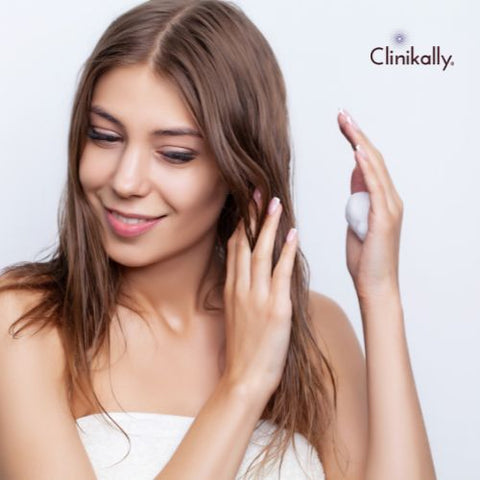
The following advice can help you avoid developing scalp zits:
-
Keep your scalp clean: Washing your hair on a regular basis can help to remove excess oil, sweat, and dirt that can contribute to scalp pimples. Use a gentle shampoo and avoid using hot water, which can dry out and irritate the scalp.
-
Avoid using hair products that can clog hair follicles: Look for "non-comedogenic" or "oil-free" labels on hair products and steer clear of those that contain silicone or heavy oils, both of which can clog hair follicles and cause pimples on the scalp.
-
Avoid tight hairstyles: Tight hairstyles, such as braids or ponytails, can irritate the scalp and cause friction, leading to pimples. Choose looser hairstyles that do not pull on the scalp.
-
Wear a hat or scarf when in the sun: Because sun exposure can cause scalp acne, it is critical to protect your scalp from the sun. When spending extended periods of time outside, wear a hat or scarf.
-
Practice good scalp hygiene: Sharing combs, brushes, and other hair tools can spread bacteria and contribute to scalp pimples. Regularly clean your hairbrush and other hair tools.
-
Avoid touching your scalp: Using dirty hands to touch your scalp can spread bacteria and cause pimples. Always wash your hands before touching your hair or scalp, and try to avoid touching your scalp when not necessary.
Maintaining a Clean and Healthy Scalp
To avoid scalp acne and to advance general scalp health, it's critical to maintain a clean, healthy scalp. Here are some tips for maintaining a clean, healthy scalp:
-
Wash your hair regularly: Washing your hair with a gentle shampoo on a regular basis can help to remove excess oil, dirt, and bacteria from your scalp. Washing your hair at least twice a week is recommended, and more frequently if you have oily hair.
-
Use a gentle shampoo: To avoid using harsh chemicals that can irritate the scalp, look for shampoos that are labeled "gentle" or "for sensitive scalp." Sulfate-containing shampoos should be avoided because they can dry out the scalp by removing its natural oils.
-
Don't overbrush your hair: Over Brushing can harm your scalp and hair follicles, causing inflammation and irritation. It is recommended to brush your hair once or twice a day with a soft-bristled brush.
-
Keep hot styling tools to a minimum: Your hair and scalp can become damaged by hot styling tools like blow dryers, curling irons, and flat irons. Use the lowest heat setting possible or refrain from using hot styling tools.
-
Practice good hygiene: To prevent the spread of bacteria, wash your hands frequently and avoid touching your scalp unnecessarily. Regularly clean your hairbrush and other hair tools.
-
Use a scalp scrub: Scrubbing your scalp with a scalp scrub can help get rid of buildup, dead skin cells, and extra oil. Find a gentle scalp scrub that is designed for your hair type.
Adjusting Hair Care Routine for Acne Prevention
The prevention of scalp acne may benefit from adjusting your hair care regimen. Here are some suggestions for modifying your hair care routine to prevent acne:
-
Look for hair care items that are "oil-free" or "non-comedogenic." Avoid using heavy hair products that can clog hair follicles and cause acne, such as gels and pomades.
-
Make sure to thoroughly rinse your hair to get rid of any extra hair products that might cause acne.
-
When washing your hair, use lukewarm water rather than hot because the latter can irritate and dry out your scalp.
-
Washing your hair too frequently can dry out your scalp by robbing it of its natural oils. Try to only wash your hair once a day at most.
-
After washing your hair, dry it with a clean towel to prevent bacteria from getting on your scalp.
-
Acne can develop on the scalp as a result of friction and irritation brought on by tight hairstyles like braids or ponytails. Choose hairstyles that are looser and do not pull on the scalp.
-
Once a week, wash your hair with a clarifying shampoo to get rid of build-up and extra oil.
Avoiding Common Scalp Acne Triggers
Avoiding common scalp acne triggers can help prevent breakouts. Here are some pointers to help you avoid the most common scalp acne triggers. Avoid using heavy hair products, be cautious when using a hair styling tool, clean your hairbrush and other hair tools, avoid wearing tight hairstyles and maintain good scalp hygiene, and avoid wearing hats and other headgear for long periods of time. By avoiding common triggers for scalp acne, you can help prevent outbreaks and improve the health of your scalp as a whole. If your scalp acne persists despite taking these precautions, you should consult a dermatologist or healthcare provider for a more thorough assessment and possible treatment options.
How Scalp Acne Can Impact Hair Health
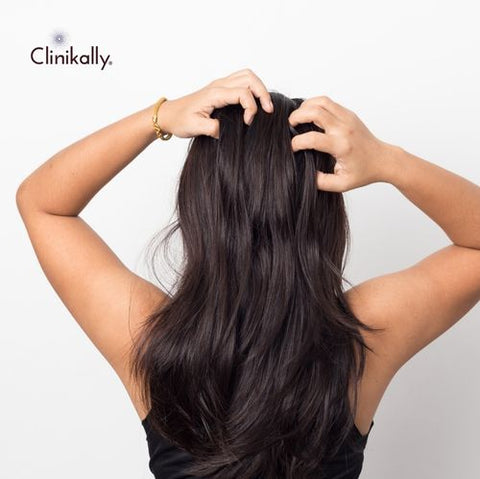
Scalp acne can be detrimental to hair health. Acne breakouts can cause scalp inflammation and irritation, resulting in hair loss and thinning. Inflammation can damage hair follicles and impede hair growth, making hair weaker and more prone to breakage. Additionally, scalp acne can make the scalp overly oily or dry, endangering the health of your hair. A greasy, heavy, and dull scalp can cause hair to become greasy, heavy, and dull, whereas a dry, brittle, and prone to breakage scalp can cause hair to become dry, brittle, and prone to breakage. Scalp acne can also have an impact on the appearance of your hair, making it appear dull, greasy, or unkempt. This can lead to embarrassment and self-consciousness, which can lower self-esteem.
The Connection Between Scalp Acne and Hair Loss
Scalp acne and hair loss can be linked. Acne on the scalp can irritate and damage the hair follicles, resulting in hair loss. Hair follicles can become clogged by extra sebum, grime, and bacteria, which will not support healthy hair growth. The inflammation brought on by scalp acne can damage hair follicles as well. When hair follicles are inflamed, they can shrink and become damaged, resulting in hair thinning and loss. If scalp acne is not treated for an extended period of time, it can cause irreversible damage to the hair follicles.
Importance of Treating Scalp Acne for Overall Hair Health
Treatment of scalp acne is critical for overall hair health. Inflammation and irritation of the scalp brought on by scalp acne can lead to hair loss, thinning, and damage. If left untreated, scalp acne can create an environment that is not conducive to healthy hair growth and can damage hair follicles in the long run. The best ways to treat scalp acne include keeping your scalp clean, avoiding common triggers, using gentle shampoos, and utilizing natural remedies and at-home treatments. It is possible to reduce inflammation and irritation, promote healthy hair growth, and prevent long-term damage to hair follicles by keeping the scalp clean and healthy. Additionally, treating scalp acne can improve the appearance of your hair. Scalp acne can make hair appear dull, greasy, or unkempt, affecting self-confidence and self-esteem. You can achieve healthy, shiny, and luscious hair by treating scalp acne, which can boost your confidence and improve your overall appearance.
Conclusion: Keep Scalp Acne at Bay for a Healthy Head of Hair
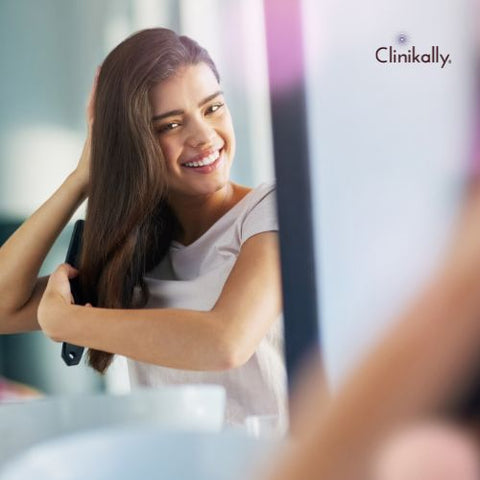
Scalp acne is a frustrating and unpleasant condition that can have a negative impact on hair health and appearance. Understanding the causes of scalp acne and taking preventive measures can help to keep it at bay while also promoting healthy hair growth. Scalp acne can be prevented by practicing good scalp hygiene, avoiding common triggers, using gentle shampoos, and incorporating natural remedies and home treatments. Additionally, consulting a professional for help with severe cases can help with identifying the root cause of scalp acne and recommending the best course of action. You can improve your overall appearance and boost your self-confidence by taking care of your scalp and promoting healthy hair growth. Remember that healthy hair begins with a healthy scalp, so keep scalp acne under control for a full head of hair.

